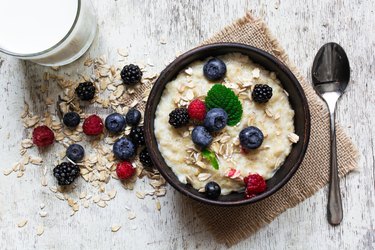
If your stomach is growling when you drag yourself out of bed in the morning, your first instinct, normally, isn't to whip up a fancy meal. Usually you grab whatever breakfast food is easiest. Oatmeal is often recommended, but if you buy the wrong brand, it's an extra shot of sugar in the morning that can leave you sleepy and unable to concentrate for the rest of the morning.
Eating a large portion of oatmeal or oatmeal with added sugar in the morning can make you sleepy.
Video of the Day
Video of the Day
Is Oatmeal a Good Breakfast?
Oatmeal has been billed as a health food because it's rich in fiber and can lower LDL cholestrol, according to an article from Harvard Health Publishing. Some companies have taken this health food and added sugar and processing techniques that make it less healthy. This is the kind of oatmeal you should avoid if you want to be productive in the morning.
It might seem like oatmeal is the perfect breakfast food if you want energy for the day. Raw oats are 66 percent carbohydrate, according to an article from Healthline, and carbohydrates are an incredibly potent energy source. If you pick the right type of oats, you can reap the benefits.
Read more: Is Oatmeal a Good Breakfast for Weight Loss?
How Carbs Affect Energy Level
As you digest carbohydrates, sugars from the food you eat enter your bloodstream. Once your blood sugar levels begin to rise, your body releases a hormone called insulin to take sugar out of your blood stream and store it in places like your muscles or liver where it can be used or stored for later.
If you eat a high-carbohydrate meal, your blood sugar increases significantly and you need to secrete a lot of insulin to return your blood sugar to normal levels. The glycemic index is the most popular method used for determining how a certain food affects blood sugar. The higher the glycemic index, the bigger the spike in blood sugar and the longer it stays elevated. Sleep-inducing foods tend to have a high glycemic index.
If you eat a meal lower in fiber, it's more easily digested and your blood sugar rises quickly. High-fiber foods, like steel-cut oatmeal, are harder to digest and make your blood sugar rise more slowly.
Read more: What Is the Nutritional Value of Oatmeal?
Use Glycemic Load to Avoid Tiredness
To take the size of your meal into account, a system called glycemic load was developed which incorporates the glycemic index. The measurement is called glycemic load.
According to an article from Harvard's School of Public Health, oatmeal has a medium glycemic load. Peanuts are an example of a low glycemic load food, while soda is an example of high glycemic load.
Foods that are high in glycemic load quickly raise your blood sugar, which subsequently leads to a crash because insulin quickly takes sugar out of your bloodstream. Fluctuations in blood sugar are noted to cause tiredness and even irritability, according to an article from University Health News, which is why you might feel sleepy after eating sugary types of oatmeal.
Pick the Right Oatmeal
To avoid the spike in blood sugar that can make you tired and cranky, you have to carefully select your oatmeal. Some brands of instant oatmeal add sugars which give them a much higher glycemic load. Try to avoid oats that already have sugar in them.
Taking it a step further, the size of the oats can affect the impact on blood sugar. A 2017 study published in the American Journal of Physiology shows that oat flakes have a lower glycemic index than ground-up oats. Opt for larger, sturdier oats to lower the blood sugar spike of your morning oatmeal.
If you feel sleepy after eating oatmeal, try steel-cut oats or even plain instant oatmeal and cook it in the morning using water or milk to add flavor. Once it's cooked, you can add flavoring like cinnamon or a bit of flavorful brown sugar. Fruit like blueberries or raisins adds flavor without significantly boosting the carb count of the meal.
Oatmeal and Bloating
Portion control is another area of concern. One cup of cooked oats is considered to have a medium glycemic load. However, eating more could raise the impact on your blood sugar and make you bloated because of the high fiber content. Try to stick to around 1 cup in the morning, unless you find that you're still hungry afterward.
Other Causes of Fatigue
If you're feeling unusually tired in the morning, or if it becomes a consistent problem, you should see a doctor. While it helps to avoid sleep-inducing foods, medical conditions like anemia and chronic fatigue syndrome that can cause such problems require medical attention.
Insulin resistance also affects how you digest carbohydrates and can cause your blood sugar to spike very high when you eat carbohydrates like oatmeal. Your doctor can give you a glucose test to see if you're having trouble processing carbohydrates, which can be a sign of type 2 diabetes.
- Healthline: Oats 101: Nutrition Facts and Health Benefits
- Harvard T.H. Chan School of Public Health: Carbohydrates and Blood Sugar
- American Journal of Physiology: Oatmeal Particle Size Alters Glycemic Index but Not as a Function of Gastric Emptying Rate
- University Health News Daily: Symptoms of Reactive Hypoglycemia and Insulin Resistance
- Harvard Medical School: Harvard Heart Letter: 11 Foods That Lower Cholesterol
- IBS Treatment Center: Food and Fatigue